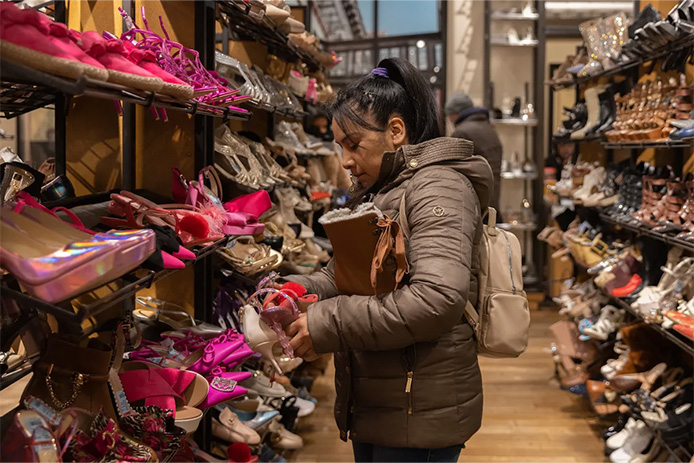Is Footwear Turning The Corner on a Rough U.S. Wholesale Market?

Inventory excesses and conservative buying strategies made for difficulties in the wholesale channel throughout 2023.
But as the industry wraps up its fiscal year, some brands are already touting recovery in their wholesale businesses — a positive sign for the industry’s trajectory in 2024.
This week, Steve Madden said its wholesale channel, which was challenged throughout 2023, showed signs of improvement in Q4, with revenues in that channel up 4.9 percent to $354.8 million. According to BTIG analyst Janine Stichter, Steve Madden‘s recent results can be viewed as a positive bellwether for the industry and for other companies with sizable wholesale businesses.
“We continue to view Steve Madden as an early and outsized beneficiary of the broader wholesale recovery,” explained BTIG analyst Janine Stichter in a Wednesday note to investors. “While overall ordering patterns remain conservative, especially among department stores, we are pleased to see progressive improvement, reflecting cleaner channel inventories.”
Birkenstock, which has taken efforts to narrow its wholesale focus to select partners, has also managed to see growth in that channel. The newly public company reported this week that its wholesale business grew 22 percent in Q1 against “a challenging backdrop in the wholesale market,” chief executive officer Oliver Reichert said.
According to Williams Trading analyst Sam Poser, the comfort sandal company is seeing success from its decision to be intentional about expansion.
“[Birkenstock’s] wholesale growth reflects increasing demand and broader and deeper assortments within existing doors,” Poser wrote in a Thursday note, adding how the brand’s new accounts mainly consisted of specialty running accounts in the U.S. and new partners in Asia. “The strategy of building out assortments with existing successful wholesale partners, rather than using, even a controlled, shotgun approach has driven, and will continue to drive increasingly profitable sales, and further enhance the Birkenstock brand.”
Also this week, work and military boot conglomerate Rocky Brands reported a 13.3 percent decline in wholesale in Q4. The company’s Georgia, Muck and Xtratuf brands all saw strong growth in their respective wholesale channels, though its B2B Lehigh business was down year-over-year.
“[Rocky’s] overall picture is one of a gradually recovering wholesale channel, aided by largely clean channel inventories, supported by solid growth in retail,” Stichter wrote in a Thursday note.
But despite these recent bright spots, other companies like Crocs, Under Armour and Skechers have been slower to show positive results in wholesale, especially in North America channels. Despite the slow recovery, some executives are still largely optimistic about improvement potential for the back half of the year.
Skechers, for example, recently posted that wholesale sales were down 8 percent in Q4, mainly due to “some retailers conservatively managing inventory levels and taking goods closer to season,” Skechers chief operating officer David Weinberg said in a February call with investors.
Despite this wholesale dip, Skechers‘ management said recovery in the sector is forthcoming and early reads from January suggest better order trends on the horizon for 2024. Analysts were also upbeat about Skechers’ potential to pick up its wholesale performance in 2024.
In a Feb. 2 note, UBS analyst Jay Sole touted Skechers’ optimism about strong January wholesale bookings and recovery in Europe as a good sign.
“Based on these positive indicators, we think Skechers’ wholesale business should return to growth in [the first quarter of 2024],” he wrote.
